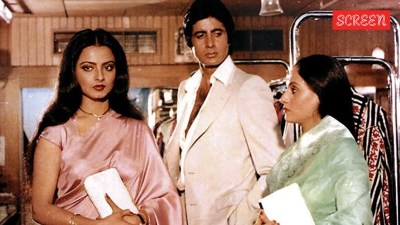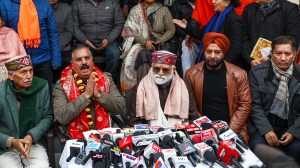Why has the government banned online money games, and what could be the economic impact of the new law?
The law has removed the distinction between games of skill and games of chances, on which courts have pronounced a number of judgments. Several states have notified laws and regulations on online gaming.
 Dream11, which was endorsed by some of India’s biggest sports stars, was the lead sponsor of the national men’s and women’s cricket teams from 2023 before it pulled out of the Rs 358 crore deal this month.
Dream11, which was endorsed by some of India’s biggest sports stars, was the lead sponsor of the national men’s and women’s cricket teams from 2023 before it pulled out of the Rs 358 crore deal this month. Parliament last week passed the Promotion and Regulation of Online Gaming Bill, 2025, which seeks to create a comprehensive legal framework for India’s burgeoning online gaming sector.
The Bill, which received the President’s assent on August 22, aims to promote and regulate segments like e-sports and online social games while imposing a blanket prohibition on all online games involving money.
The rationale for the ban, according to the Bill, is the “serious social, financial, psychological and public health harms, particularly among young individuals and economically disaddrevantaged groups” of online money gaming.
These games “use manipulative design features, addictive algorithms, bots and undisclosed agents, undermining fairness, transparency and user protection, while promoting compulsive behaviour leading to financial ruin,” the Bill says.
The “unchecked expansion” of these games, according to the Bill, is “linked to unlawful activities including financial fraud, money-laundering, tax evasion, and in some cases, the financing of terrorism, thereby posing threats to national security, public order and the integrity of the State”.
Here’s the context in which the ban has been imposed, and the economic impact of the government’s decision.
First, what activities specifically are targeted by the new law?
A strict set of prohibitions and penalties have been imposed for involvement in online games with monetary stakes – games in which real money changes hands.
The law prohibits any person or entity from offering, facilitating, advertising or participating in an “online money game”.
The definition of such games is expansive, covering any online game played by paying fees or depositing stakes with the expectation of winning money or other forms of enrichment, “irrespective of whether such game is based on skill, chance, or both”.
Crucially, this definition explicitly excludes esports, of which an Olympic event will be held in Saudi Arabia in 2027, and which the Bill seeks to promote as a legitimate competitive sport through guidelines, training academies, and incentive schemes.
According to the Esports Federation of India (ESFI), esports or ‘electronic sports’ is “a competitive sport where gamers use their physical and mental abilities to compete in certain genres of video games in a virtual, electronic environment”.
Esports video games are multiplayer games, they can be online and/ or offline (physical); however, the ESFI website says, “casual video games, Fantasy, Teen Patti, Rummy, Poker, Betting, Gambling etc. is not esports”.
The new law also seeks to promote “online social games”, which do not involve staking money.
What is the penalty for violating the law?
The Bill lists severe penalties.
Offering an online money gaming service can lead to imprisonment up to three years and a fine up to Rs 1 crore. For repeat offences, the jail term can extend to five years, and the fine to Rs 2 crore.
Advertising or promoting such games, including by social media influencers and celebrities, can result in a two-year jail term and a fine of Rs 50 lakh.
Repeat offenders could face up to three years in prison and a fine of up to Rs 1 crore.
Banks and other financial entities are prohibited from facilitating any transactions for online money gaming services. Contravention can lead to a three-year jail term and a fine of up to Rs 1 crore.
Authorised officers can conduct searches of physical and digital premises and make arrests without a warrant if they have a reasonable suspicion that an offence is being committed under the law.
Do the provisions of the new law reflect a consistent position of the government?
On the contrary, the ban on online gaming marks a significant departure from the Centre’s previous stance.
Just two years ago, in April 2023, the Union Ministry of Electronics and Information Technology had introduced amendments to the Information Technology (Intermediary Guidelines and Digital Media Ethics Code) Rules, 2021, creating a regulatory framework for “permissible online real-money games”.
That was largely seen as a pro-industry measure to provide policy certainty with regard to the real-money gaming sector. The new law, which cites risks to public health, financial integrity, and national security, has reversed that earlier approach.
The most significant departure from established precedent is the removal of the distinction between games of skill and games of chance.
The outcome of a game of chance is based entirely on luck – for example, the roll of a dice or the toss of a coin. The outcome of a game of skill, on the other hand, largely depends on the skills of the player – their memory, knowledge, judgment, or expertise that determine their moves in the game.
Is this distinction between games of skill and chance established legally?
Courts have emphasised the difference between the two kinds of games on a number of occasions.
They have held that games of skill are a legitimate form of trade and business, which are protected by Article 19(1)(g) of the Constitution. This provision guarantees the right to practise any profession, or to carry on any occupation, trade, or business.
* In 1967, the Supreme Court held that playing rummy was not barred by the anti-gambling law of Andhra Pradesh because rummy is “mainly and preponderantly a game of skill”.
* In 1996, the top court excluded from the anti-gambling law of Tamil Nadu the placing of bets on horse-racing. The court reasoned that horse-racing itself was a game of skill, dependent on several factors such as the breed, form, and fitness of the horse, the capability of the jockey, and the length and nature of the racecourse.
Predicting the winner of a race, therefore, is a result of knowledge, study, and observation.
* In 2021, the Supreme Court upheld the dismissal of a public interest litigation demanding a ban on the fantasy cricket app Dream11 by the Rajasthan High Court.
The top court referred to judgments by the Bombay and Punjab and Haryana High Courts that held fantasy sports to be games of skill. According to both these High Courts, success in fantasy sports was not contingent on a particular team winning or losing any one match – rather, it was based on the participants’ knowledge, attention, and judgment of the performance of all athletes playing the sport.
Dream11, which was endorsed by some of India’s biggest sports stars, was the lead sponsor of the national men’s and women’s cricket teams from 2023 before it pulled out of the Rs 358 crore deal this month.
* On the other hand, in 1995, the Supreme Court held that Tamil Nadu’s anti-gambling law covered video games. This is because video games cannot be won only through skill, especially because the result of the game could be manipulated by tampering with the machine on which it was played.
What sort of laws and regulations do states have on this subject?
“Betting and gambling” is a subject in the State list of the Seventh Schedule of the Constitution, so several states have passed legislation to regulate online gaming in a number of ways. However, these laws cover only games of skill, and not games of chance.
* In 2008, Sikkim became the first state to regulate and license all forms of online gaming and betting. The state permits 13 types of games, as well as sports betting, upon obtaining a license.
However, online games, under the law, could only be played at designated gaming parlours in the state.
* Nagaland passed a law in 2015 to license betting on online games of skill. This law contains a detailed list of 23 categories of online games that are recognised as games of skill.
* In 2023, Chhattisgarh enacted a law banning online gambling and betting, but excluded games of skill.
* On the other hand, Telangana was the first state to ban all forms of online games played for stakes by amending its Gaming Act in 2017. Several other states followed with similar laws banning all online games played for stakes: Andhra Pradesh in 2020, Karnataka in 2021 and Tamil Nadu in 2022.
* The Karnataka law was struck down in 2022 by the Karnataka High Court for being unconstitutional for banning games of skill.
* The Tamil Nadu law was partially struck down by the Madras High Court in 2023 too, to the extent that it barred games of skill.
* In 2021, the Kerala High Court struck down a state government notification banning online rummy. The court relied on the Supreme Court’s 1967 judgment that held rummy to be a game of skill.
The court said that even if online rummy was played with monetary stakes, it did not change the nature of the game. Therefore, barring online rummy operators from providing their services impinged on their right to carry on any trade or business.
What sort of economic impact will the ban have?
The online gaming sector is a significant contributor to the digital economy. India’s online gaming market generated revenues of around $3.7 billion in 2024, and was projected to exceed $9 billion by 2029, according to a joint report by WinZO Games and the Interactive Entertainment and Innovation Council (IEIC).
The sector supports over 1 lakh jobs and was on track to employ 1.5 lakh people by 2025, according to a report by the Foundation for Economic Growth and Welfare and Primus Partners.
The real money gaming segment contributes nearly 86% of the sector’s revenue. The largest share of money transfers in online gaming is done through UPI.
The government has calculated a potential annual GST revenue loss of Rs 15,000 crore to Rs 20,000 crore following ban on online money games. As per the industry, it pays over Rs 20,000 crore annually in direct and indirect taxes.
- 01
- 02
- 03
- 04
- 05






































